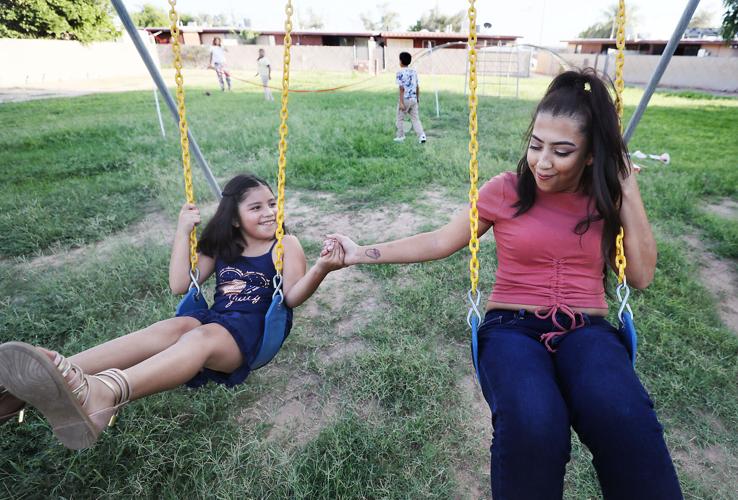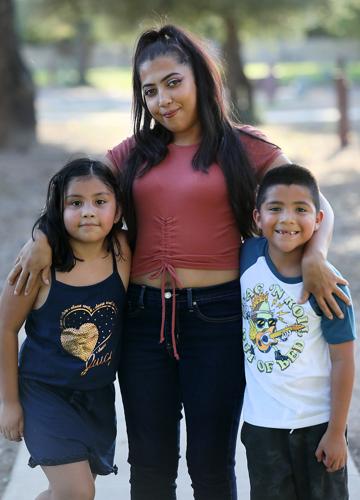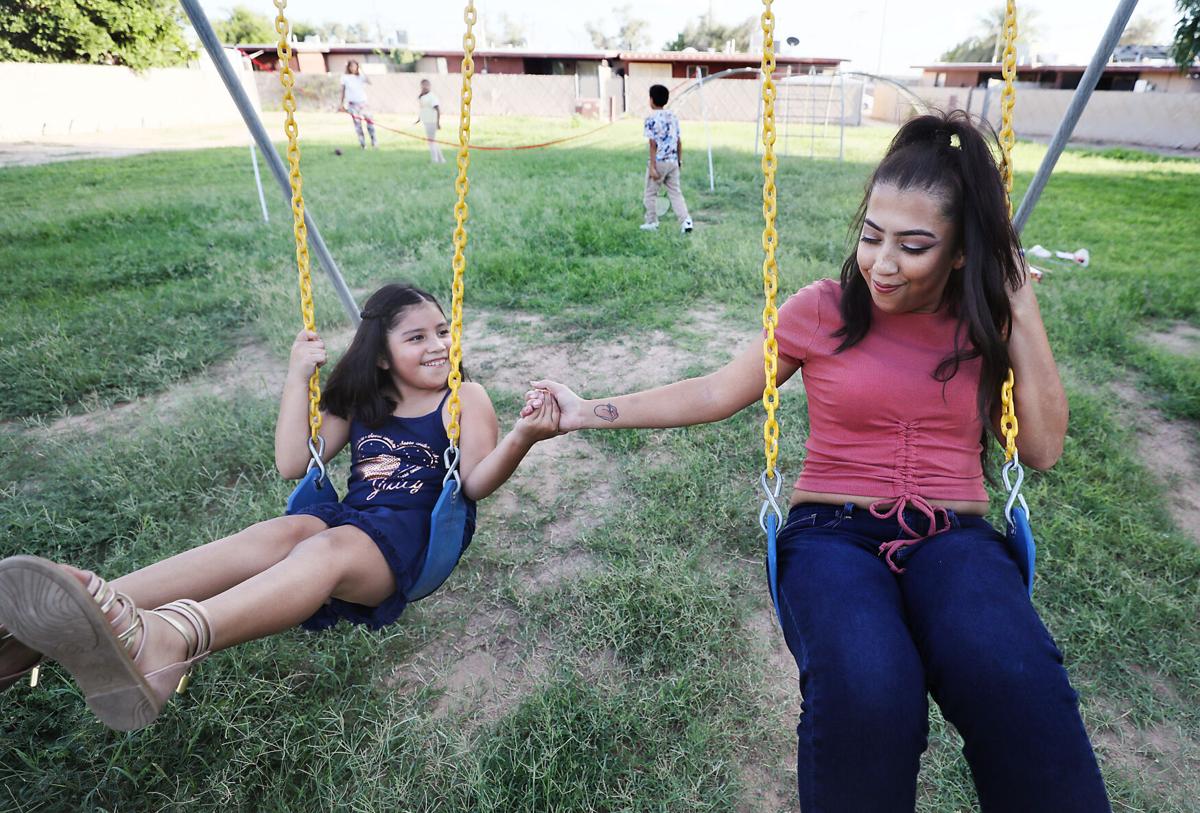This story was made possible by a grant awarded to La Estrella de Tucsón by Solutions Journalism Network, an organization dedicated to promoting journalism that analyzes community responses to specific problems.
Two years ago, Monique Ortega, 26, felt trapped. A single mom of two young children, she was struggling to find work that was stable enough for her to qualify for a child care subsidy from the Department of Economic Security. At the time, she was living in Phoenix and the cost of living was high. She struggled to pay $50 a week for basic child care so she could go to work.
The stress was constant and demoralizing, she said.
“I just felt helpless. I had no support system when I was in Phoenix. It was really just me on my own,” said Ortega, who dropped out of high school when she was 16. Although she got her GED, all of her job prospects seemed like dead ends, she said.
After moving to Tucson, she found the Pathways for Single Mothers program, a project of the Women’s Foundation of Southern Arizona. The program provides wraparound services, including scholarships for full-time, high-quality child care, transportation, tuition and an emergency fund for parents pursuing a qualifying certificate or degree program.
“I don’t think I ever had that experience in my life, where I felt like, actual support,” she said. “Being a mom, it’s always about your kids.”
Ortega chose a logistics and supply-chain management certification program through Pima Community College, and finally, she felt hope.
“I didn’t know anything about logistics, but this sounded like something that could really help me get on my feet,” she said. “It was a way out. I didn’t want to keep doing the same cycle and not having anything to show for it.”
Thanks to a new amendment to Arizona statute, more low-income parents will have the opportunity for social mobility. HB 2016, signed by Gov. Doug Ducey in April, waives a 20-hour-per-week work requirement for parents receiving Arizona Department of Economic Security child care subsidies. That means low-income parents who are already qualified for DES child care subsidies will have the option to enroll at an accredited educational institution or employment training program and still maintain their child care subsidy.
The legislation is already in effect, but the benefit to parents is still a ways off.
DES is currently establishing contracts with colleges and universities to create a scholarship program which will help outline eligibility requirements, DES spokeswoman Tasya Peterson said. The expanded eligibility should be in effect by spring 2022.
Child care scholarships will be available to students pursuing degrees in programs that lead to economic self-sufficiency, including nursing, early childhood education and K-12 education. DES is also partnering with the Women’s Foundation to make sure the new scholarship program is successful, Peterson said.
Currently, 36,439 Arizona families qualify for DES child care subsidies.
The success of the Pathways pilot program, now in its second year, demonstrated the need for HB 2016, said Amalia Luxardo, CEO of the Southern Arizona Women’s Foundation, one of the major proponents of the legislation. So far, 23 women have participated in Pathways for Single Mothers, and 13 of them are Latina.
Tens of thousands of low-income women in Southern Arizona could benefit from HB 2016, Luxardo said. Research from the University of Arizona, commissioned by the Women’s Foundation, estimates that 33,000 low-income single mothers in Southern Arizona have no postsecondary education and could dramatically improve their financial situation with targeted training and education programs, such as the one-year certificates in fast-growing industries offered by Pima Community College. But completing those training programs almost always requires access to child care.
By covering the cost of child care, the state could save $20,000 for each family who is able to achieve financial self-sufficiency and get off public assistance, Luxardo said.
“You’re talking about millions of dollars that could be reallocated to other things,” Luxardo said.
And the legislation will be of particular help to Latino families, she said.
In Arizona, there are 323,558 households led by single women with children, according to a Women’s Foundation analysis of data from the 2019 American Community Survey, a program of the U.S. Census Bureau. About 40% of those holdholds — 129,681 of them — are led by Latina women, the data showed.
While many may have extended family to rely on, “there’s only so much our families can do for us before we get to a point where we’re all overextending ourselves,” Luxardo said.
Single mothers are half as likely as other women to have a four-year degree, driving lower wages for that demographic, according to a research brief from the University of Arizona. None of the five most common occupations for single mothers of young children provide a median wage higher than $30,000, the brief said. Even working full-time, these mothers are still likely to live in or near poverty and require public assistance to survive.
HB 2016 brings self-sufficiency into the reach of more families, said Magdalena Verdugo, CEO of YWCA Tucson.
“It’s a huge win,” Verdugo said. Supporting women on the path to self-sufficiency is the goal of much of YWCA’s programming and services, and YWCA has also connected women to the Pathways program, introducing them to “careers that they possibly never thought they could have,” she said.
The Pathways program intentionally focused on promising career pathways that don’t require a four-year degree and in which women can earn a true living wage.
But many of those fields, like logistics and building construction technology, have been traditionally male-dominated, and women may have been reluctant to pursue them in part due to a sense that they wouldn’t be as flexible for the needs of working parents, Verdugo said.
Consistency, particularly in housing and education, is crucial for kids, but achieving that requires parents to be stable first, Verdugo said.
“We need to stabilize the mom or parent in order to extend that stability to the child,” she said.
During the pandemic, with child care centers and schools shutting their doors, many are realizing how crucial child care is for families, Verdugo said.
Yet much of the child care burden has fallen to women during the pandemic, who put their lives and careers on hold to stay at home with their children, she said.
Advocates are hopeful that there is growing momentum around support for high-quality preschool, in terms of its benefits for both children and parents.
“If there’s anything good that came out of COVID it’s that it revealed to a lot of people the critical role that child care plays for two generations,” said Liz Barker Alvarez, policy director for state agency First Things First, the state’s early childhood agency, funded by a tobacco tax, which supports early learning and development of children ages birth through 5. “More and more policymakers at all levels are starting to recognize that early learning is something we do need to invest in.”
“Game-changer”
Leaders at Pima Community College were cautiously hopeful that HB 2016 would pass this year, said Brian Stewart, vice president of Pima’s Northwest Campus.
“It does tell us there’s a shift in our community, recognizing that children really are our future and our lifeblood,” he said.
Pima Community College is working to add on-campus child care capacity to accommodate an anticipated influx of parents taking advantage of HB 2016, Stewart said.
Pima’s research shows that the Desert Vista and West campuses have fewer existing high-quality providers of early childhood education, he said. Without convenient child care options for students, it’s more likely they’ll struggle with their studies, he said.

Research from the University of Arizona estimates that 33,000 low-income single mothers in Southern Arizona have no postsecondary education and could dramatically improve their financial situation with targeted training and education programs, like the one-year certificates in fast-growing industries offered by Pima Community College.
“Students have to drive somewhere, drop their kids off, run to campus, run back to pick up their kids at child care,” he said. “That means they take less classes, or they miss classes. … There’s no back-up support.”
Construction of new child care centers will begin first at the Desert Vista campus on the south side, where 60% of students are Latino, Stewart said. The center should be complete by summer 2022, and it will start small, serving 15 to 20 children ages 3 to 5, then grow as needed, he said.
“We really want to support parents who are putting their child in high-quality early learning programs, which exist but they’re necessarily right next to our campuses,” he said.
Existing child care deserts in Tucson — areas with an undersupply of licensed child care providers — have been exacerbated by the pandemic, he said.
“What we know is a lot of child care providers closed during COVID,” he said. “There’s already a desert, it just makes the desert worse. (In surveys,) our students were speculating that without child care, they will not come back to school. It’s just not possible.”
In talks with parents about their child care needs, First Things First staffers learned that lack of access to child care was a significant barrier in furthering their education, said Jessica Harrington, senior regional director in Southern Arizona for First Things First.
Fast-track programs, like the 13-month licensed practical nursing program at Pima Community College, are better options for working parents — but missing even one class due to a child care emergency could derail a student’s studies, she said.
“That coursework is incredibly important, but if you miss a day, your education could be jeopardized. You have to be there every single class, and making up classes is really hard,” she said.
With HB 2016, “We think this is going to be a huge game-changer,” Harrington said. “We’ll see a lot more interest from families to be able to be in a position now to access and to focus on their higher education.”
Arizona at work
HB 2016 will make a real difference in the lives of parents seeking to improve their financial position, said Pam Valencia, a workforce enrollment specialist at Pima County’s Arizona at Work program, a statewide workforce development network, formerly known as One Stop.
Between 85% and 90% of her clients are Latina, the majority single moms, she said.
For years, Valencia’s clients faced a massive waiting list for DES child care subsidies. And for her clients who needed child care so they could go back to school, those subsidies were unavailable, she said.
That was a common situation: Valencia recalled one client who was working as a caregiver and who hoped to become a licensed practical nurse and secure a higher wage. But without access to child care for her children, she was stuck in the same low-paying job, Valencia said.
“That’s really rough when you see somebody who’s making, at that time, $10 an hour, who probably could be making $20-something an hour” with training, she said. But before HB 2016, pursuing that training would have required giving up DES child care subsidies, she said.
“They lose hope. I would see a lot of clients that were frustrated, like, ‘I’m trying to better myself. Don’t they see it?’” she said. “It was disheartening to see that, but there was nothing I could do at the time.”
HB 2016 has removed at least that one barrier for her clients, she said.
Looking ahead
While HB 2016 is a start, state leaders must truly commit to supporting early childhood education, said Barbie Prinster, program director for the Arizona Early Childhood Education Association, a membership-based nonprofit that represents licensed child care centers and advocates with the legislature.
The pandemic brought an infusion of federal emergency relief dollars to the state, which has helped rescue the child care industry. But the state’s general fund only devotes $7 million to child care for children in the custody of the Department of Child Safety, the state’s child welfare agency. That’s compared to $85 million general fund dollars, before massive cuts that were prompted by the 2008 recession, said Nicole Fyffe, assistant to County Administrator Chuck Huckelberry.
“The question a lot of us have is whether the state will step up and restore general funding to at least pre-2008 recession levels, after COVID federal funding ends,” Fyffe said.
During the 2008 recession, then-Gov. Jan Brewer defunded the low-income working parent portion of child care assistance, and it was never restored, Prinster said.
“We’re so thankful for the federal money,” Prinster said. But, she said, “If all the federal funding today went away, we still wouldn’t be funding working families. It’s really kind of contradictory to the governor’s messaging around ‘Arizona is open for work.’”
Advocates must continue to lobby the state legislature to devote funding to child care, she said.
“Child care is part of our infrastructure. It’s part of our economy,” she said.
For Pathways program participant Ortega, education has become a steppingstone to a better life. Ortega said when she was growing up, her father instilled in her the importance of education. But when he died of cancer when she was a teen, Ortega said she lost all motivation, dropping out at age 16.

Monique Ortega, 26 mother of Aaliyah, 8, and Dominick, 6, is taking part in a logistics and supply-chain management certification program through Pima Community College.
“I gave up on myself,” she said. She gave birth to her daughter Aaliyah at age 18, around the time she got her GED, and then she had her son Dominick at age 20.
Today, Ortega is throwing herself into her pursuit of higher education. Her logistics classes count toward the associates degree she’s now pursuing at Pima Community College, and she plans to get her bachelor’s degree after that.
Ortega’s children are now 6 and 8 and in elementary school, so she doesn’t need child care support anymore. But she said the other support services offered by Pathways have been critical to her success.
If HB 2016 had been around when she desperately needed access to child care, she would have started pursuing her new career path years ago — and avoided a lot of stress, she said.
“If that legislation had been around earlier, I would have started all this earlier,” she said. “I would recommend it to any woman, anybody who feels like they’re stuck in a situation like mine.”
How to apply
HB 2016 allows the Arizona Department of Economic Security to waive the 20-hour-per-week work requirement for parents who are already receiving child care subsidies, and who want to transition to a qualified education program. That waiver will likely be in effect by spring 2022.
But parents do need to be working to secure the DES subsidies in the first place. Only then will they have the option of maintaining those subsidies, while enrolling as a “full-time student in a vocational, technical, or trade certification, or an associate degree or bachelor's degree program, that is tied to the parent's employment goals,” DES spokeswoman Tasya Peterson.
Parents interested in applying for DES child care subsidies should visit des.az.gov/child-care and click on the “Families” tab near the bottom of the web page.
To be eligible, a family’s household income cannot exceed 165% of the federal poverty level, which is $43,725 for a family of four.
What does this story mean to you?
Knowing how this story may have influenced you can help steer future reporting that provides value to readers.
Please let us know what you think by taking the Arizona Daily Star's survey here.







